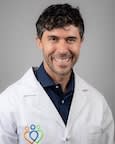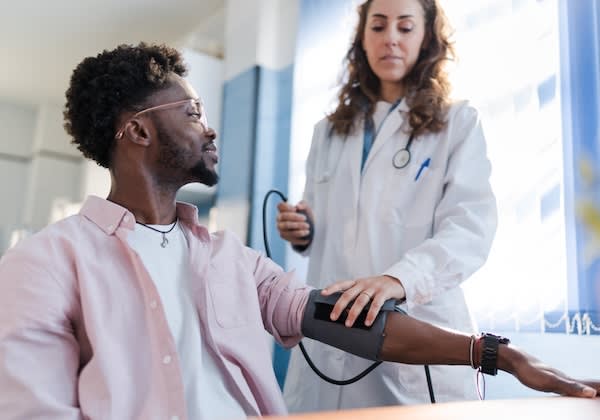[7 MIN READ]
In this article:
-
If you have high blood pressure, it’s important that you lower it to decrease your risk for heart disease and stroke.
-
While prescription medications are certainly an option, you can also lower your blood pressure by changing some of your lifestyle habits.
-
There are no over-the-counter medications for high blood pressure. However, there are several medications that could increase your blood pressure, so it’s important to talk to your doctor.
Managing blood pressure: Medication alternatives and over-the-counter (OTC) options
Blood pressure is one of those aspects of your health that can give you a big clue about how things are going in your body. High blood pressure, or hypertension, is a major risk factor for heart disease and stroke, and it can lead to kidney disease, vision loss and other health problems.
It’s clear, then — you need to control your blood pressure. But is it possible to lower blood pressure without medications or just using over-the-counter (OTC) blood pressure pills? Read on to find out.
Understanding blood pressure
Your blood pressure is the measure of the force of blood pushing against your blood vessels’ walls. High blood pressure, or hypertension, is when the blood pressure is elevated in a way that increases a person’s lifetime risk of developing coronary artery disease, stroke or congestive heart failure.
Blood pressure is measured using two numbers: Systolic blood pressure measures the pressure in your arteries when your heart beats. Diastolic blood pressure measures the pressure in your arteries when your heart rests between beats. When a health care provider takes your blood pressure, they will refer to it as systolic over diastolic, or “120 over 80.” It is written as 120/80 mmHg.
According to the Centers for Disease Control and Prevention, a normal blood pressure is anything that is less than 120/80 mmHG. A person has high blood pressure if their numbers are consistently 140/90 mmHg or higher.
The best way to determine if you should take steps to lower your blood pressure is to talk to your health care provider.
Lifestyle changes to lower blood pressure naturally
If you are diagnosed with high blood pressure, your health care provider may prescribe medication. “For some people, blood pressure medication may be the first medication they are asked to take,” says James Beckerman, M.D., FACC, a cardiologist at Providence Heart Institute. “That could be a difficult line to cross.”
But medication isn’t the only path to lower blood pressure. Here are five recommendations for lowering blood pressure without medication by living a healthy lifestyle.
1. Get moving
“It isn’t entirely known why physical activity lowers blood pressure,” says Dr. Beckerman. “We do know that it improves blood flow to the muscles and extremities. In doing so, exercise lowers the overall resistance to blood flow throughout the body, which in turn lowers blood pressure.”
Each week, your heart can benefit from the recommended 150 minutes of cardiovascular exercise. You can get this regular physical activity by engaging in such activities as:
- Walking
- Jogging
- Swimming
- Cycling
- Dancing
2. Reduce your salt intake
“One of the ways your blood regulates its volume of water is by regulating salt,” says Dr. Beckerman. “Our kidneys absorb or excrete salt. “When there is more water in the body, there is more water in the blood vessels, which increases pressure on the walls of blood vessels.”
You can make the following dietary changes to reduce your sodium intake:
- Avoid processed foods.
- Use low-sodium or no-salt-added products.
- Cook at home more often.
- Choose lean meats and dairy products and eat plenty of fruits and vegetables.
- Read food labels carefully.
3. Quit smoking
Nicotine, the main active ingredient in cigarette smoke, constricts your blood vessels, which can lead to high blood pressure. You can use these resources to help you quit smoking:
- Smoking cessation classes
- Local support groups
- Medicines to help you quit
- Nicotine replacement therapies, such as patches or gum
4. Limit alcohol
Alcohol consumption narrows your blood vessels, which leads to high blood pressure. The American Heart Association recommends that you stick to the following guidelines:
- Men should drink no more than two alcoholic beverages per day.
- Women should drink no more than one alcoholic beverage per day.
You should also not drink alcohol when you are taking certain medications. Talk to your doctor about whether any amount of alcohol is safe for you.
“It’s important to recognize that the American Heart Association’s recommendations are not for a goal amount of alcohol to consume,” says Dr. Beckerman. “Most recent data suggests that any alcohol intake is not good for you.”
5. Sleep well
Sleep affects blood pressure because it helps manage stress hormones like cortisol. When you don’t sleep enough, your body has difficulty regulating these hormones, which leads to high blood pressure.
According to the Centers for Disease Control and Prevention, adults should get at least seven hours of sleep each night. For better sleep, you should:
- Ensure your room is dark, quiet and cool.
- Stop using screens at least one hour before sleep.
- Go to sleep and wake up at the same time each day.
- Avoid caffeine and alcohol in the evening.
Over-the-counter options for blood pressure management
While there have been more and more OTC medications approved to treat other conditions over the years, there are no OTC drugs for high blood pressure — and for good reason.
There are, however, a number of OTC medications that can increase your blood pressure, putting you at even more risk for heart disease, stroke and other complications. These include:
- Decongestants
- Non-steroidal anti-inflammatory drugs (NSAIDS), such as ibuprofen (Advil) and naproxen
- Some cold and flu medications
- Some antacids and stomach medications
- Herbal remedies
If you have high blood pressure, it’s best to talk to your Providence doctor before taking any over-the-counter medications at all. It’s also important to consult with a doctor before taking any vitamins or supplements.
Stress reduction techniques for better blood pressure
Stress reduction techniques can help lower blood pressure. Researchers have said that chronic stress can lead to increased blood pressure, which means if you reduce your stress, you can lower your blood pressure, too.
Some of the best ways to reduce your stress include:
- Working on your time management skills – if you can manage your schedule well, you will experience less stress
- Learning relaxation techniques – these include meditation, yoga, deep breathing exercises and guided imagery
- Nurturing yourself – some examples include going for a walk, treating yourself to a massage and listening to music
- Seeking professional help – you may need to enlist the help of a Providence behavioral health specialist
When you need prescription medication
Sometimes, however, lifestyle changes aren’t enough to lower your blood pressure. In those cases, your primary care provider can help you find a prescription medication that’s right for you.
Some examples of different kinds of prescription drugs for high blood pressure include:
- Diuretics – help your body get rid of excess salt and water
- Beta-blockers – lower the heart rate, which can lower blood pressure
- Angiotensin-converting enzyme (ACE) inhibitors – help the blood vessels open up
- Calcium channel blockers – prevent calcium from entering the heart’s muscle cells and arteries
- Alpha blockers – reduce the arteries’ resistance
- Blood vessel dilators – cause the muscles in the blood vessel walls to relax
“Each person is different, so it’s best to work with your doctor to find the blood pressure medication solution that’s right for you,” says Dr. Beckerman. “It’s common for people to need more than one medication to get their blood pressure in check.”
Contributing caregiver

James Beckerman, M.D., FACC, is a cardiologist at the Providence Heart Clinic - St. Vincent.
Find a doctor
If you are looking for a primary care provider or cardiologist, you can find what you are looking for in our provider directory. Through Providence Express Care Virtual, you can access a full range of health care services.
Download the Providence app
It’s all in the app: easily stay connected with Providence and your health. With the Providence app, you can schedule appointments, have virtual visits from the comfort of your home, get personalized health recommendations, access your health records and so much more. Learn more and download the app.
Related resources
Why young adults need a primary care doctor
Take control of your blood pressure
This information is not intended as a substitute for professional medical care. Always follow your health care professional’s instructions.
About the Author
More Content by Providence Health Team
















